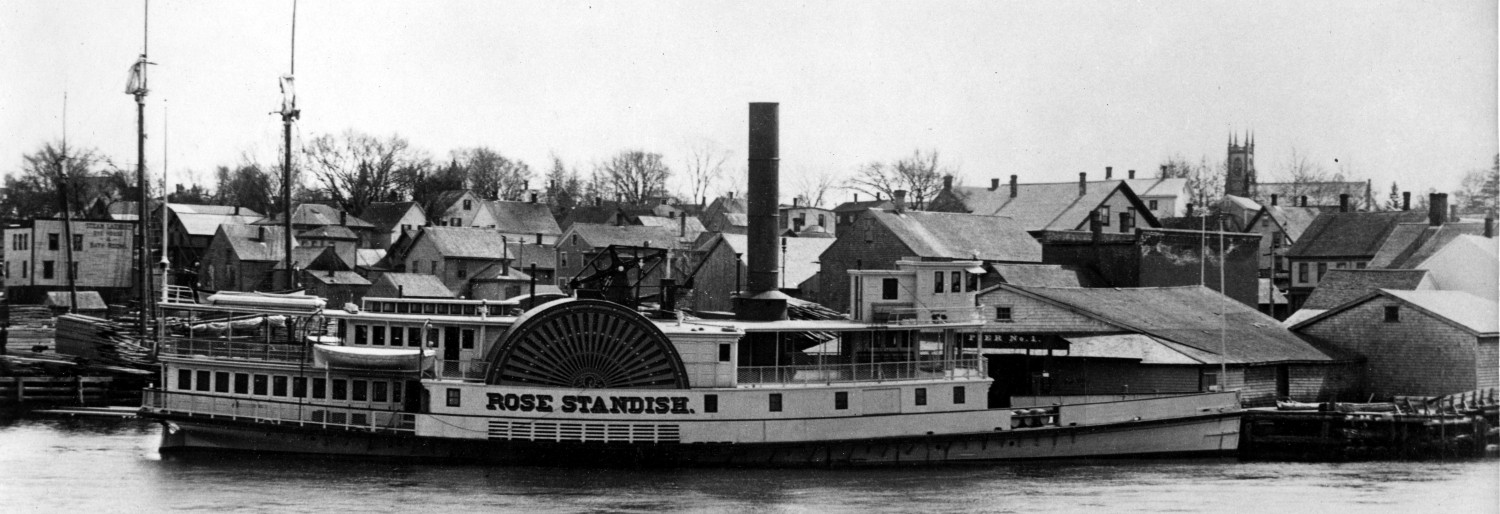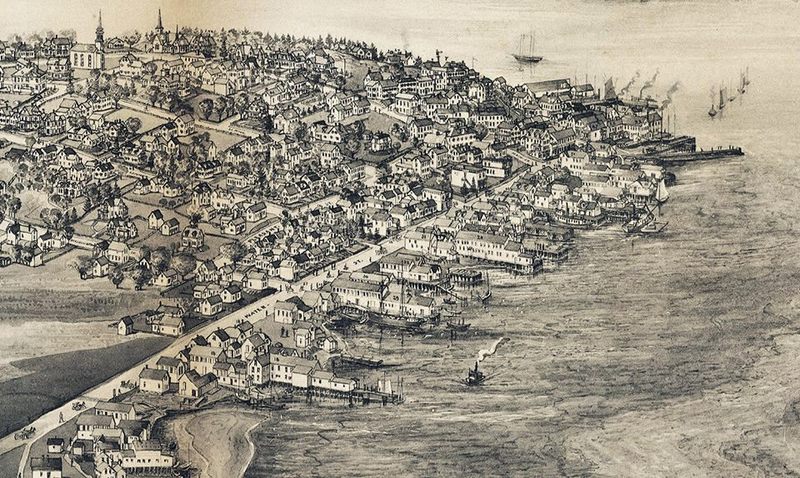
In 1896, Lubec was a busy and reasonably prosperous town. The 1896 sketch above shows a waterfront lined with wharves . . .
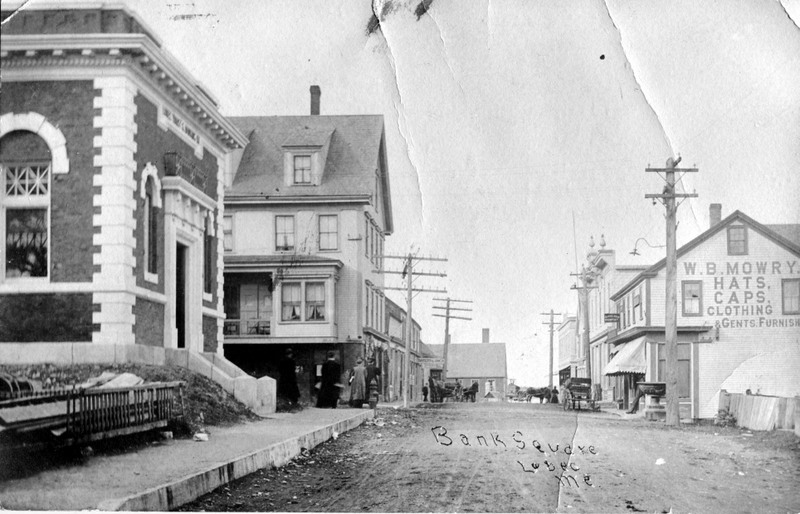
Bank Square, Lubec, Me
. . . and a downtown with many impressive public and private buildings. However, the part of Lubec destined for fame and, although short-lived, fortune is not shown on the map.
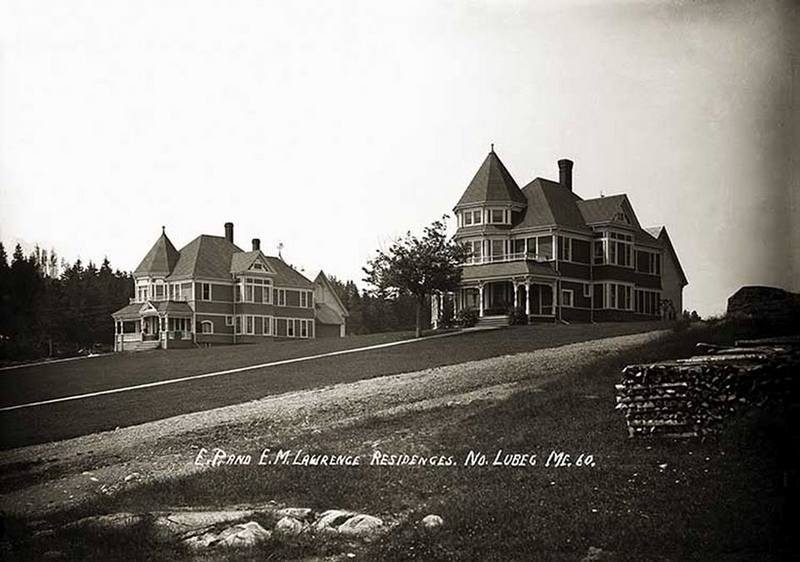
There is a section of the town known as North Lubec which in 1896 was not without its charms. Graced by beautiful homes and a spectacular view of one of the loveliest bays in the world the “upper crust” of the town found it a pleasant and quiet part of town in which to live.
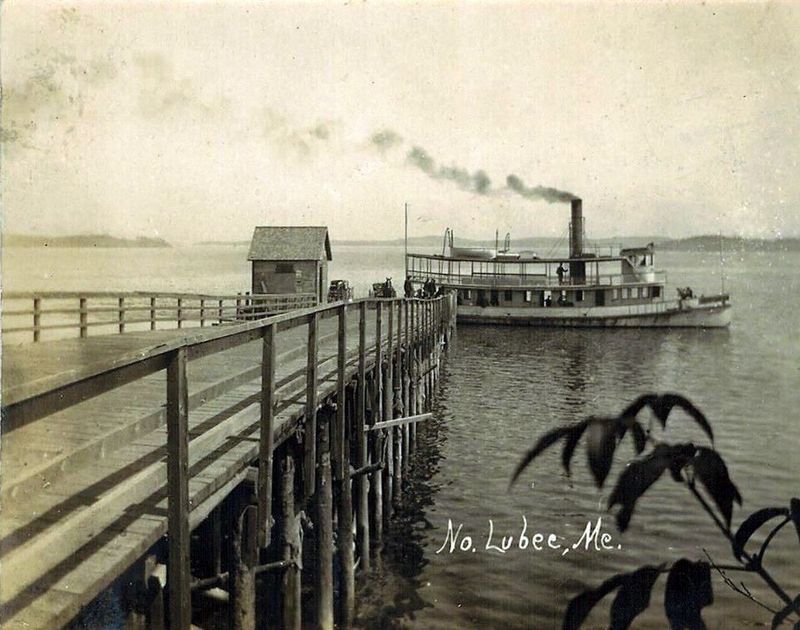
It had a steamship connection with the town and . . .
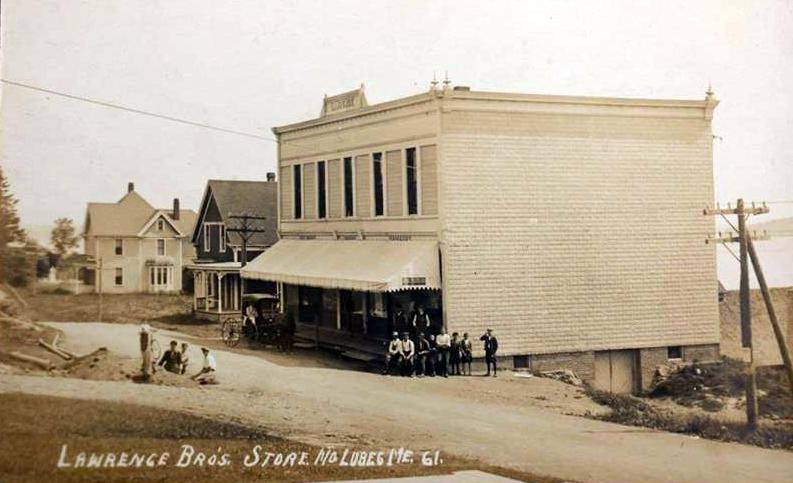
. . . the Lawrence Brothers general store quite satisfied the needs of this small village. In 1896 the inhabitants would certainly not have credited the notion that in 1897 the goings on in their little piece of heaven were to become a matter of national, even worldwide, interest.
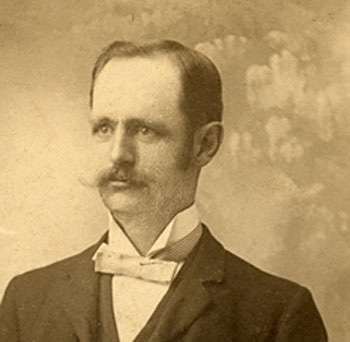
There is nothing like gold to excite the greed gene in most people. The prospect of personally “striking it rich” with a pick and shovel or, even better, by developing a process to either change other substances into gold or somehow extract gold from something which occurs naturally in large quantities seems irresistible. Human nature being what it is, unscrupulous alchemists have, since early Greek civilization, emptied the pockets of the wealthy with harebrained schemes to transform other metals into gold. Even con artists who make no claim to being chemists have found it fairly easy to convince the gullible and greedy that getting rich is as simple as investing in their novel and brilliant scheme. It helps to begin, as did the right Reverend Prescott Jernegan, pictured left, with a proven scientific fact. In the Reverend’s case this was that sea water, of which we have an ample quantity locally, contains trace amounts of gold and silver.
There are conflicting explanations of when the seed was planted in Jernegan’s fertile and corrupt mind that a person could extract gold from seawater or, in the alternative, be convinced that he could do so.
According to the Eastport Sentinel of November 24, 1897:
In July ’96, Jernigan [sic], who was at Cottage City on his annual vacation from church work in Florida, was sick with typhoid fever. During his sickness his brother read to him every day. and one of the things he read was that there was a very large quantity of gold and silver in the sea. The fact arrested the sick man’s attention. He thought it over all the while he was recuperating.
The brother is to figure prominently later in the story but may not have inspired Jernegan in the first place as another version claims the idea came to Jernegan in a vision while in a fever recovering from typhoid. Either way the idea is not novel, scientists have known it was possible to extract precious metals from seawater since the early days of alchemy but it was not economically feasible to do so. The “trace amounts” were just that and the expense of extracting the gold was prohibitive unless, of course, one happened to have a “secret process”. As it happens, developing this “secret” process was not so difficult even for layman if one had the assistance of another experienced fraudster and deep-sea diver like Charles Fisher who became Jernegan’s partner in crime and was later known as the “Alchemist” and some said the brains of the outfit.
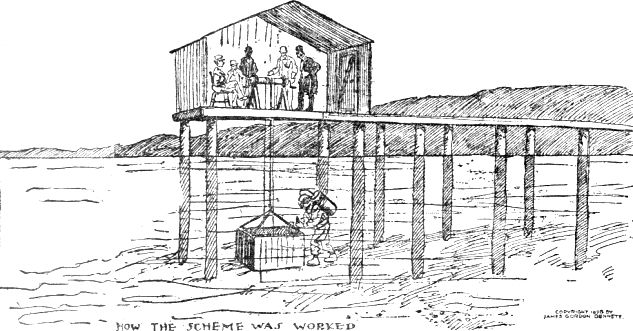
Jernegan, the pastor at New England church among whose parishioners were several gullible businessmen, let slip his possession of this secret. Much interested they asked if he might provide them a demonstration and some idea of the nature of the process. He acceded to the former but not the latter. A confidant of Fisher’s later explained what transpired when the capitalists met Fisher and Jernegan at Providence Rhode Island on Narragansett Bay the site of the demonstration:
From the Eastport Sentinel – August 3, 1898:
On the following day the capitalists arrived, registered at the City Hotel in Providence, and that afternoon they went to the wharf, where they remained overnight in the little house. The quicksilver (mercury) which they had brought with them was deposited in the submarine tank before it was lowered into the sea. Then the current was turned on from Jernegan’s battery, while the capitalists watched the operations, silently and in wonder. These men sat there all night waiting in bitter cold in February for the gold to accumulate in the box. These confiding gentlemen—supposed to be shrewd business men— when they dropped their own honest quicksilver into the square lead lined box little dreamed that Fisher, the diver, would come around later, walking on the bottom of the sea, and empty their quicksilver into the water, replacing it with some doctored mercury of his own, well saturated with gold.
“I was told subsequently by Jernegan himself that on the following morning, when the submerged box was hoisted out of the water, it was found that the mercury had eaten through the lining of the box and some of it had disappeared into the sea. Enough, however, remained to show the value of the alleged experiment.”
To still further aid the demonstration, Jernegan slipped a little California nugget, which he had been wearing as a scarf ornament, into the quicksilver, to be dissolved. “This greatly added to the yield of gold from the salt water of the sea. The contents of the box were then given to an assayer, who made his analysis, while the capitalists waited in the reception room.
“The assayer’s report made the yield about 84.50— a fairly good night’s work for a little box in the bottom of Narragansett Bay with only an ordinary battery to do the mining and abstract the gold from the sea water.
“The capitalists were not only satisfied but amazed at the result, and said they were willing to put up handsomely for building machinery on a large scale that would take gold by the carload out of the sea.”
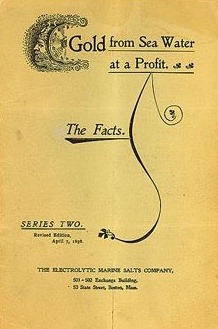
The word of this successful demonstration soon found its way into New England financial circles and investors began clamoring to buy stock in the venture. A Maine Corporation was formed with ten million dollars of authorized stock—the equivalent of $330 million today. Nearly all was sold and North Lubec was chosen as the site for the operation. Many questions were raised about the North Lubec site, some claiming it was chosen because of its isolated location and the whole enterprise a fraud which needed to be well out of the sight of inquiring eyes.
These suspicions were ridiculed:
Article in Eastport Sentinel June 8, 1898:
(Note: While we quote from many articles in the old Sentinels, we want to point out that these were not necessarily written by the Sentinel staff. Some came from individuals and others from regional papers)
A great many questions have been asked why the Klondike people came to Lubec to operate their business, when there was such a quantity of salt water in other localities? Well, the question is not very hard to answer, if persons would allow their reasoning faculties fair play. When the discoverer of the secret, Mr. Jernigan, found it was a success, and he could actually get gold from the sea water, the first thing to be considered was a plan to extract it on a paying basis. One grain of gold from a ton of water was a small amount, and to pump the water in sufficient quantities would require a vast expenditure of capital. He sought the information wanted at the right source, the United States Coast Survey, who placed before him charts and surveys of the United States coast, and with these before him he very readily saw that the coast of Maine, especially the town of Lubec, contained all the requisites for the prosecution of the business. With the enormous rise and fall of the tides, and numerous deep bays and creeks, where navigation did not interfere, dams could be placed and the power of the water could be controlled at will. Lubec was a place unknown to the gentleman, but the information imparted by the survey quickly decided the question in favor of this locality, and when the prospectors first arrived in town, they undoubtedly knew more about Lubec and vicinity than a great many of the residents. A full knowledge of the old grist mill was possessed by them and was taken at once as the base of operations, and what at first appeared to the citizens as a myth has become a startling reality, and thousands of dollars are being broadcast among our people weekly, and the hard working citizen in the near future will find the burden of taxation lifted from his shoulders to quite an extent by the Klondike.
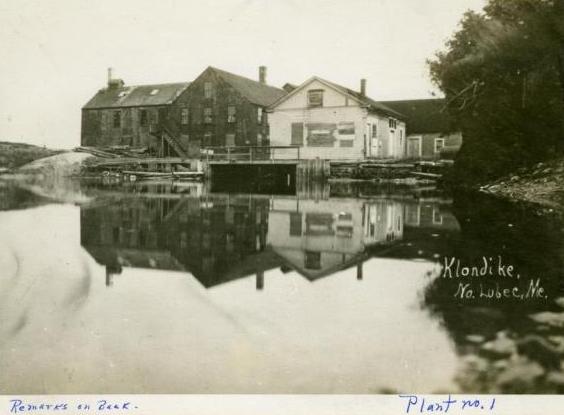
The company began operations on a small scale at the old grist mill in North Lubec pictured above. This plant was known as Klondike 1. The Bangor Commercial, dismissing the naysayers and skeptics, reported the event under the following headline:
GOLD, GLITTERING GOLD, FROM THE SALINE WATERS OF THE SEA
North Lubec, Mar. 25 — Few people in the great outside world, have yet begun to realize that there has been located in this town, and is now in process of expansion, an industry which will, if it is all that its promoters claim for it, and all that it really appears to be, revolutionize the ancient and arduous method of the gold hunter, and exert as powerful an influence upon the money centers of the world as have either Australia, the Rand, Cripple Creek, California or the Klondike.
For centuries gold has been dug from the earth; here it is strained out from the mighty waters of the sea, a reservoir that never fails, a mine that must forever remain inexhaustible. The proposition to “take gold from sea water,” though old to science, is new in the domain of the practicable, and it has never before been demonstrated that it could be done at a profit. The Electrolytic Marine Salts Co. however, claims to have so combined the scientific and the practicable that it is not only possible to wrest from the ocean its golden treasures with satisfactory profits, but that thing is now being done here in North Lubec, every week day and night of the year.
Just what the mysterious process is, no one outside of the five men who possess the secret knows. It is supposed to be partly electric, partly chemical, but it is so carefully guarded that its exact nature cannot even be guessed. The plant now running is provided with 114 machines, each of which turns out an average of $1.25 a day in gold and silver. Work is being pushed night and day on an extension to this plant which will give room for at least 150 more machines, making 264 in all, with an estimated daily output of $330. Only six men are required to run this plant, and the only power that has to be provided is a 26 horse-power engine to run the dynamo. The tides do the rest. But this plant is only the beginning.
The problem for Jernegan and Fisher, the Alchemist, was the ongoing construction of Klondike 2 which, rather than having 264 “accumulators” allegedly converting seawater to gold daily, there would soon be 20,000. Five hundred men were working on the new plant and when completed it would be impossible to salt the output each day with gold dust and the fraud would be exposed. Up to then the investors were satisfied with the small quantities Fisher extracted, and Fisher was in sole charge of emptying the accumulators which he had salted the night before. All that would soon change when output was to increase one hundred-fold. Salting all these “accumulators” with gold dust would have been impossible. One day in the early summer of 1898, the contractor and workers were surprised when Jernegan and Fisher did not appear at the plant. A search for the two was of no avail although it was discovered that most of the papers and all the cash had disappeared from Jernegan’s office. The contractor, suspicious, brought up the accumulators and the contents were assayed. No gold was found even though the accumulators had run the entire night.
The Eastport Sentinel summed up the story in its headline and extensive article of August 3, 1898:
THE ELECTROLYTIC MARINE SALTS CO. OF NORTH LUBEC, LIKELY TO BE PROVEN THE COLOSSAL SWINDLE OF THE AGE
The gold bubble was pricked on Wednesday last when the New York Herald announced that the Rev. P. F. Jernegan, the inventor of the process for extracting gold from sea water, and promoter, vice president, and general manager of the company that for the past year has been in operation, had sailed for Havre, France, on the Saturday previous, under an assumed name on the steamer Navarre. The immense scope of the operations of the company has been thoroughly explained and all are familiar with it.
The most important developments have been on the Boston end of the company, for there the principal office of the company is located. That the process of Jernegan was a myth, and that the other officers of the company, possibly with the exception of assistant manager, C. E. Fisher, confidential friend and co-conspirator with Jernegan were as well as the general public duped, is at this stage of the developments believed to be true.
That this should be true seems almost incomprehensible; that successful business men, for such his associates are, should be deceived by a process that has been denounced by scientists since the inception of the plant is to some hard to understand; but to others seems reasonable; for here was a minister of the gospel, respected and believed by the very men he was to rob, known to them as an honest, upright and Christian gentleman, it was not strange that when he revealed to a wealthy parishioner his so-called secret he was enabled to borrow a few thousand to carry on a series of experiments that promised such results.
This was the beginning: The company was formed under the laws of Maine, and capitalized at $10,000, (KM). Then C.E. Fisher came into prominence as the assistant manager of the Electrolytic Marine Salts Co., and the scheme by which these men were to rob the public, not excepting relatives and friends, was fairly launched. The agreement made by the company with Jernegan, was that he was to have 45 per cent, of the gross receipts from the sale of stock, the balance to be devoted to working capital, salaries, commissions etc. From the first issues of the stock, Jernegan drew his percentage, and everything went well, the machines were turning out the gold, the public was clamoring for stock, which was on the upgrade in price, and the perpetrators of the crime were raking in the shekels as their share of the nefarious scheme. After the denouement of Wednesday, all eyes in this section were turned toward Lubec: A. X. Pierson, Manager of Construction, communicated with the Boston office, and as a result all work was stopped Friday noon the men employed by him directly being paid off on Saturday and discharged.
Later an examination was made of the accumulators, the tests being made as carefully as usual, but without the guiding hand of Fisher, the Alchemist. The result was that neither gold, silver or any other substance was produced; in tests of two machines made by Jernegan and Fisher some time previous, for the purpose of convincing him and another of the officials of the value of the process, the gentleman stated that he saw the deposit taken from the machine to the laboratory, saw the work of separation conducted, and before leaving was handed from the crucible a nugget containing gold and silver, weighing 6¼ to 10¼ penny weights respectively. This was what clinched his belief. This only verifies the claim that the production of gold, for the company has taken it from the accumulators, was received by this Fisher, as the chemical that Jernegan claimed as his secret, mixed only by him, and containing gold and silver in solution in sufficient quantities, which, when used according to formula, yielded the amount of gold weekly shipped West, which so much care was taken to announce.
If this theory is not true, then perhaps the salting was done by some “friend” of Fisher’s imported for the purpose, who had access to the mill at all times. Everything was going smoothly, Jernegan and Fisher were getting rich, thousands of dollars were being spent at Lubec building Plant No. 2, the completion of which Ryan, Pierson, Usher and others believed would speedily lead to the wealth of all concerned, while Jernegan and Fisher knew it would be their Waterloo, for while they might be able to salt and take care of the “ process’’ in the plant of 239 machines, after the operations had spread out to an additional 1,000 machines the risk of detection would be largely increased; but it would be a year before that would be finished. In the meantime, near the last of June, at a directors’ meeting held in Boston, it was voted that no more commissions to promoters or others be paid in cash until Plant No. 2 building be completed. Jernegan was then in Lubec; he left for Boston early in July, and Fisher followed for a ten days’ vacation. That vote precipitated the crisis: There was no more direct cash to come from the company; for the managers to take stock and sell it when the market was going up looked bad; as the completion of the plant drew nearer, the danger of detection of the fraud increased; so Jernegan and Fisher decided their safety was in flight, leaving their associates to face the outraged public.
That the promoters of the scheme were bent on defrauding all who came within reach is illustrated by an incident relating to the man who first befriended the religious fraud, and who now suffers the loss of $14,000 through his acquaintance: This is the gentleman who advanced several thousands of dollars to Jernegan to further his experiments, and after the formation of the company took stock for his pay; afterward when stock was scarce and advancing, Jernegan borrowed from him his block and agreed to return it in thirty days; later certificates were returned, but since Jernegan’s departure it is found to be certificates procured through other than the regular channel, and not recorded in the book of the company, and consequently had no value at any time; probably it was cheaper to have them printed than get them from the company at $.10.
At Lubec, everything about the plant is at a standstill; investigations have been carried on a so-called electric apparatus, which was essential to the work has been found to be but a bluff, there being no cumulative parts to it, and the dynamo was moved by the engine but generated no current; if it ever was a serviceable machine, then it has been wrecked by someone. Various exaggerated reports have been sent broadcast over the country about the effect the exposure had on business in this locality; but for the noise of those who knew the least and professed to know the most, it would have never been known that the plant had stopped. It is estimated that Lubec will lose from $5,000 to $10,000 in stock held there; but as a large portion of that was taken in payment for land sold that would not bring at a cash sale one half what it bought in stock, the real loss will not be felt by the people there. In this city there are about $1,800 invested in the stock the loss of which will not create much of a panic.
On Saturday a letter addressed to Pres. A. B. Ryan from Jernegan at New York, that had been in Lubec for a few days, was opened by Mr. Pierson. It contained a full acknowledgment of the fraud and exonerated every one of the company save himself and C. E. Fisher. He added that the fraud grew on their hands, that the magnitude which it had reached was not conceived at its inception and made a clean breast of the whole matter.
On Monday contractor Shanahan began paying off the men, which was done as fast as the pay roll could be made up. Many attachments have been served on the property of the company, and probably no one outside of the stockholders will be losers. Monday night Phelan spoken of as “Billy” arrived in North Lubec as a detective and at his instigation Arrington the chemist was arrested as an accomplice, and put under $25,000 bonds, in default of which he will be committed to Machias.
The following is the facts in the story of the suspicious actions of the “erratic” clergyman prior to his departure for Europe, as published by the New York Herald:
Rev. H. F. Jernegan, the vice president and general manager of the Electrolytic Marine Salts Co., sailed for Europe last Saturday under an assumed name, and the facts here narrated indicate that he carried with him a trunk full of good negotiable government bonds. These bonds were bought by his brother in this city during the preceding 10 days. The movements of this brother round town lugging a grip sack filled with $ 1,000 greenbacks, emptying it in payment for bonds and turning up the next day with another grip full of money, form one of the queerest incidents in the story. Where did he get all this actual cash every day? A young man representing himself as F. W. Thompson appeared in the office of a brokerage firm in Wall street, on July 15, and asked them to buy for him $10,000 in government bonds. He had no letter of introduction but said that he had seen their advertisement and had called to do some business with them. They bought the bonds and he paid for them in cash. A few days later he bought $15,000 more bonds and paid for them in cash also, which large cash payment excited the astonishment of the brokers.
It was soon discovered that this mysterious person had a box in a safe deposit vault in the vicinity of Wall Street, and that he was in the habit of calling there every morning. His movements here also were mysterious. He always arrived in a cab with another person. The cab would stop on the opposite side of the street, and, the curtains being closely drawn, it was impossible to see who this person was. Thompson also carried a travelling bag, which he seemed either to empty or fill every morning on his visit to the vault.
One day he brought from the Wall Street house already mentioned $25,000 in government bonds, the cost of which at the market price was about $31,000. It was late in the afternoon when he called for them. He stated that as he didn’t have sufficient money in the bank; he could not draw a check, but he said he could get the cash at the deposit company, and so he rushed to the deposit vaults with his bag in hand. The keen eyes employed by the Fourth National were secretly following his movements. He entered one of the booths of the safe deposit company. He took no money out of his box, but he opened the bag and took out stacks of $500 bills. These he sorted and rearranged and replacing them in the bag, hurried back and handed over the $31,000 to pay for the bonds. It was so unusual a transaction that the banking house was suspicious as to the genuineness of the bills and sent them over to its bank for examination. On their being reported as good, the bonds were delivered. These large transactions were kept up for several days until an aggregate of about $150,000 in bonds had been purchased. Thompson began to show evidences of uneasiness, and on Friday last the keen eyes ever watching him saw him go to the office of the French line steamers. Here he engaged passage to Europe for Louis Sinclair and wife, of No. 15 Market Street, Chicago. On that same afternoon Rev. P. F. Jernegan called at the Brooklyn institution where he did business and drew $28,000 in large bills, closing the account.
Upon the following day—last Saturday—he appeared on the steamship Navarre with his wife and boy, accompanied by Thompson, who had evidently called to say adieu to his brother, for it had been ascertained that Thompson was not Thompson but that he was M. W. Jernegan, of Providence, R. I., brother of the minister. The bank had a photographer on hand to take a snapshot of this interesting party, so that their identity could be clearly established if necessary. Upon examination of the passenger list the Rev. P. F. Jernegan’s name could not be found, and after a rigid search it could not be established that Louis Sinclair was ever located at No. 15 Market Street, Chicago, that address being a vacant lot.
The aftermath was grim. Locals lost many thousands of dollars and their hopes for future riches had vanished with Jernegan; investors in the company were out nearly ten million dollars. Newspapers throughout New England had a field day exposing the fraud. The August 1, 1898 edition of The Boston Herald reported, “Never did a fisherman bait his traps with more alluring or attractive morsels that did Reverend P. F. Jernegan tickle the fancy and stimulate the greed of victims with his brilliant and enticing prospectus of the Electrolytic Marine Salts Company, now a practically defunct organization, with the reverend promoter flown to foreign parts, an alleged swindle of the first magnitude.”
The Herald also reported on the local scene, “Everything is quiet here in Lubec tonight as could be expected with 700 men suddenly thrown out of employment, and the fond hopes of the last eight months for the building up of a prosperous city around the fabled gold producing plant, dashed.”
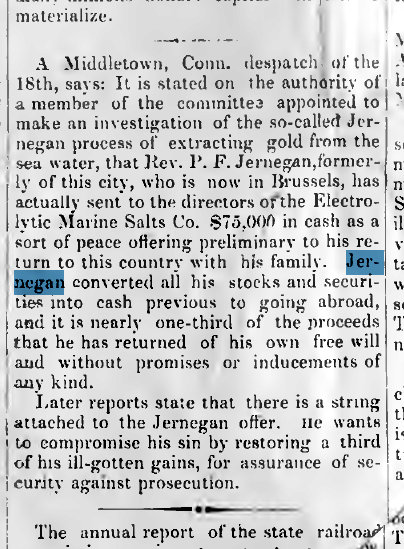
In fact, nearly one-third of the money was recovered, $75,000 being returned by Jernigan himself in hope of leniency if prosecuted. There is much debate about how much Jernegan managed to spirit away to Europe, but his accomplice Fisher turned up in Australia where he probably lived quite well until his death a few years later. As to Jernegan, his wife divorced him after returning to the States and by 1903, after living in Paris, Brussels, London, Vienna and surprisingly the Pacific Northwest, he obtained a fairly lucrative teaching position in Manila. In December of 1903 he sat for a rather lengthy interview with a correspondent of the Boston Herald with which we will leave you.
Prescott F. Jernegan, New England’s Most Famous Swindler, Teaching School in Far Away Manila.
FOR THE FIRST TIME THE COMPLETE STORY OF HIS TRAVELS AND EXPERIENCES IS TOLD. HIS RETURN TO THE UNITED STATES PENNILESS AND BROKEN DOWN IN HEALTII AND SPIRITS.
From Special Manila Correspondent to the Boston Sunday Journal
Rev. Prescott F. Jernegan, author and promoter of the most picturesque swindle in recent years, is in Manila. He holds a position here under the United States govern- ment as a teacher in the Normal School.
Jernegan, “the robber of widows and orphans,” is paid $1500 a year by the government to impart secular and moral instruction to the youth of Manila. He has been here since May 1901, and, so far as is known, is well liked as a teacher.
Just where the Rev. Mr. Jernegan got the references necessary to secure his appointment is something of a mystery. It is known here that he failed to obtain them from certain of his victims in the United States, to whom he applied, the assumption being that memories of the Electrolytic Marine Salts Company have died hard.
Since the successful exploitation of the great swindle, Mr. Jernegan has been a wanderer upon the face of the earth. No one here pretends to know much about his later history. Indeed, his very presence is unsuspected by all but a few. Thus far those who know the secret of his life have kept silent.
Had he cared to adopt an assumed name it is doubtful if his identity would ever have been revealed. Instead, he has chosen to live his life under his own name, trusting to luck that no one familiar with his past would ever cross his path in this out of the way place. Mr. Jernegan has naturally been reticent regarding his own affairs, yet at times he has unburdened himself to a few close friends.
It seems that when he fled from the United States in the summer of 1898 he traveled for some time throughout Europe, bringing up finally at Vienna. He found that city quite as gay as Paris, and a good deal less conspicuous. In the French capital there too many Americans to suit a man in his position.
At that time there was a good deal of talk among his victims in Boston and vicinity of having him extradited. His whereabouts had been traced. Wherever he had gone a trail of letters had followed. Some were in the nature of piteous appeals. Many were threatening. Whatever their character they annoyed the reverend gentleman exceedingly and he determined to make a stand in Vienna. He employed the best legal talent in Austria. Before leaving this country, he had been shrewd enough also to retain one of the best lawyers in New England. Both of these gentlemen told him he need not fear extradition. They went further than that. They assured him he could not be prosecuted even in the United States.
The Boston Journal readers doubtless remember more or less about Jernegan’s famous scheme to extract gold from sea water. He fooled some of the best people in New England and at the same time so skillfully handled the swindle as to clear his own skirts, at least so far as criminal liability was concerned.
Having demonstrated while in Vienna that he could not be extradited and that he could not be forced to refund a single dollar of the $120,000 with which he left the United States, the Rev. Mr. Jernegan did a strange thing. He actually sent back $85,000 to the treasurer of the great busted bubble, the Electrolytic Salts Company. He was under no legal obligation to do so. It was thought he had become frightened and had thrown the money as a sop to his dupes.
Later it was realized that Jernegan had been actuated by no such motive. The return of the $85,000 was a nine days’ wonder at the time. Since then (the fall of 1898) the world has heard absolutely nothing of Rev. Prescott F. Jernegan. For five years he has been as one dead. Many thought he was dead. Some of his victims had kept a sharp lookout for him in Europe but had never laid eyes on him. It turns out, however, that for at least two years of this time he was in the United States. Jernegan has everywhere been recognized as a clever man. The world may not yet be prepared for the statement that he is an honest man as well. Not a few of his victims still believe in him—that is, that he was more sinned against than sinning.
The vast majority of people, however, both in the Electrolytic Marine Salts Company and out of it, believe that the reverend gentleman was the smoothest rascal that ever turned a trick. Mr. Jernegan, by force of circumstances, was recently impelled to talk of his affairs. The story he told is a remarkable one.
He did not seek to justify his actions. He confined himself to a narrative, more or less complete, of his wanderings and experiences since he fled from the wrath of his dupes in the States. The story is presented herewith exclusively in The Boston Sunday Journal. It is given in Mr. Jernegan’s own words, as nearly as can be quoted from memory:
“I left the United States in the summer of 1898 with much less money than people generally credited me with. It was supposed I had at least $300,000. As a matter of fact, I had but little over $100,000.
“The exact amount doesn’t matter now. At the time it seemed a good, big sum. I thought I had enough to see me through.
“My health had at times been very bad and my wife was a semi-invalid. It had always been my dream to live out my life as a man was meant to live. Instead, I had always been hanging on to the ragged edge of things—a man of educated tastes, of delicate health forced to exist on the pittance of a day laborer.
“When I found myself in Europe with something over $100,000 to my credit, I said to myself, ‘Now, I will live.’
“All my life I had existed on husks. I had been patronized by illiterate snobs, I had been underpaid, my mind had become embittered by a thousand acts of injustice. ‘But now,’ I said to myself, ‘I will live the life God intended a man of my tastes to live. I am free to own that I forgot I was only following in the footsteps of the man whose barns were filled to overflowing and who in his self-satisfaction said, ‘Soul, enjoy thyself.’
“It may strike you as a bit odd to hear me indulge in Scriptural quotations. I fear I have not been addicted to the habit of late. Yet, I assure you, the pertinence of the quoted parable to my own case was very real.
“I don’t care to go into this phase of the matter in detail. I will simply tell you the facts and you may judge motives for yourself.
“Not long after arriving in Europe I sent back $85,000 to an officer of the Electrolytic Marine Salts Company in whom I had confidence.
“I was not obliged to do this. The best legal authorities in both the United States and Australia told me that technically the money was mine; I did not fear legal action. I was not criminally liable. Yet I returned $85,000. I understand that the man to whom I sent the money refused to receive it. I knew him to be absolutely honest and was positive that it would find its way into the treasury of the company. I learned afterward that acting under power of attorney, Mr. Moorfield Storey secured the money on behalf of the company after it had lain in the New York bank three weeks. The money was sent from Hamburg.
“From there I wandered all over Europe. I may not be credited with the purpose but I had determined to invest the remainder of the money in the hope of winning enough to pay back all who had suffered at my hands.
“That decision, remember, was made only a short time after I had promised myself I would ‘live.’
“What do you call it? Conscience?
“I am not analyzing my motives. Neither am I asking for sympathy. I’m simply stating facts.
“I presume it makes very little difference what I say in regard to my motives. The world has its opinion. I am not finding fault with that opinion. One of the hardest lessons of life has been to maintain my own opinion regardless of what the world thinks. I believe I have thoroughly learned that lesson.
“When I sent that money back, I wasn’t foolish enough to think that people would say, ‘This man Jernegan is after all honest.’
“I knew, as I know today, that had I remitted every cent of the company’s liabilities the majority of people would have considered me a scoundrel.
“At all events I returned the money, knowing full well what I did. That I had only a few thousand left did not bother me. I had not lost faith in my ability to recoup myself and those to whom I was under obligation.
“Within a few months I found myself in England. I felt nearer to my own people by being there. As soon as I got settled, I looked about for an opportunity to invest my money.
“You may be surprised to know that the investment that appealed to me the strongest was one that was singularly like the scheme I had myself exploited in America.
“I fell in with a company that was actually trying to do what I had done, or rather what I had attempted to do—extract gold from sea water.
“From the very first I was fascinated with the scheme. I saw where I had failed and where they would succeed, or at least 1 thought I did. After a pretty thorough investigation I invested heavily, much more heavily than I was warranted in doing.
“The result? Well, I was swindled out of my money. I was literally robbed. Every cent I put in was swept away. I felt badly, of course, but what was I to do? I had taken a chance and must abide by the result. I still had about $10,000 left. By this time the desire to recoup my losses had almost become a mania with me. I was determined to earn enough to pay back every cent I owed in the world. But I lost $5000 in another investment. It was an honest enough deal in a way.
“Luck seemed to be against me. There’s no necessity of my dwelling upon all my business ventures at this time. The one word ‘disaster’ describes them all. Everything I touched turned out badly.
“I had heard a good deal about ‘Yankee smartness.’ You may take my word for it; those Englishmen can teach the Yankees the elements of such things.
“Early in 1901 I found myself with barely money enough to get to the United States. I thought it best for my wife to remain in the East. I took myself West. In the little town of Everett, in the State of Washington, I finally brought up. I was without a dollar; I was reduced to working with my hands. I tried one thing after another and was glad at last to get a good job in a sawmill. In company with the roughest of men I worked eleven hours a day handling heavy lumber for pay that barely sufficed to keep myself in food and clothes. I had to associate with all sorts of human wrecks. No one asked any questions in that country.
“The climate in the West is said to be very healthy. Perhaps it is for a man with a contented mind. I don’t know that any climate will agree with a man who is fretting his life away. I used to get crazy when I thought of it. Here I was, a man capable of intellectual work, and yet forced to do the hardest kind of manual labor. Mere labor in itself does not make a man healthy and strong. The mental attitude after all is the main thing. I was very unhappy. I was wearing my life out because I was earning merely enough to keep my own soul and body together. Believe me, when my wife was sick in the East I could not at times send her money
“It is all well enough for a man to rise from poverty to riches. I think myself that is the best way. A man then appreciates what he gets. But when one has been trained to a different mode of life, poverty—poverty of the grinding, pinching is a cruel affliction.
“If a man starts in poverty his mental horizon is usually limited in proportion to his worldly state. As he increases in wealth he expands in culture. The one doesn’t always keep up with the other, but there is never the gulf between the two as in the case of the man who starts with culture and ends in poverty.
“Many the night I have lain in my rude bed and have gazed out through the chinks at the stars shining in the heavens. I can’t tell you all the thoughts that came to me. I can’t even tell you the kind of thoughts that were mine. I hope to God I will never have to go through with it again.
“I remember one night the thought came to me that I might be able to do something at writing. ‘If true art is only achieved through suffering,’ I said to myself, ‘surely I ought to accomplish something.’
“The next day I set to work mapping out stories tor the newspapers and magazines. I had never had any training for that line of work. The result was just what I might have expected. My articles were returned ‘with thanks.’
“I believe I sold just one story. My experience convinced me that I could never do anything as a writer. I had been through enough, but I had not had the training. I lacked the knack of putting my stories together in an interesting way.
“Then I set about getting a school. There was one in Manitoba that I might have secured, only I could get no references. I wrote to those who had been my friends in the East. When they answered, it was with bitterness. Not one of those who had been my good Christian friends would believe that there was any good in me.
“One man upon whom I had relied to send me a recommendation for ability, if nothing else, answered that he would never be convinced of my fitness for a teacher until I had paid him in full every cent that he had lost through the Electrolytic Marine Salts Company. I didn’t ask for a recommendation of character but only for ability. He knew I had been a successful teacher in the East. Well, I don’t blame him, I simply mention it as one of my experiences.
“I failed to get a position in British Columbia. There was one of $2000 I might have had if I could have secured references. Everywhere I applied for a school. They asked me to give them assurances of my moral character.
“The hard life of a common laborer began to tell on me severely. I grew ill and despondent. It seemed that every change I made was for the worse. I used sometimes to wonder if I were settling down into that sodden apathy into which so many of our less intelligent appear to have gravitated. I grew wild when I thought of it. I had the ability to earn good money in a congenial occupation, and yet I had to herd with the lowest of the low and fare almost like a tramp. I don’t think that ever in my most discouraged moments I ever had the faintest idea that anyone would help me. There are probably few men at a low stage of fortune but have been buoyed up by the hope of assistance. I realized that if ever I was to rise it must be through my own efforts.
“So long as I was content to do rough work there was no trouble in finding plenty of employment. It was only when I aspired to a position of trust that I met difficulties. The moment I applied for a clerkship or a teacher’s position I was met with the inevitable question, “Have you references?’
“I had almost come to the conclusion that the world had conspired against me when I got an opportunity to come here. Teachers were wanted in Manila, I was told. I applied and was appointed. That is really all there is to tell. I must decline to go into the matter of motives. I am making no bid for sympathy. All I ask is to be allowed to work out the problems of my life as best I can.”
Perhaps no swindle in recent years attracted half the attention as that of which the Rev. P. F. Jernegan was promoter and manager. In 1896 Mr. Jernegan, who was a Baptist clergyman, made known to his friends that he had, while in Florida, revealed to him through a dream a process for extracting gold from sea water. The illiterate immediately hailed the announcement as absurd. Up to that time the ordinary run of people did not know what had long been matter of knowledge to chemists, that sea water contains small quantities of gold and silver and many other minerals. The amount of gold in one ton of sea water is about one grain, not enough under any known process of profitable operation.
Mr. Jernegan took his vision very seriously. He declared that all he wanted was a fair trial. He set about and perfected his apparatus for extracting gold, and in the course of time it was ready for trial. He had become acquainted with certain capitalists in Connecticut, that is, they were capitalists in a small way he had preached in Middletown, and he had not much difficulty in interesting several men prominent in church circles. In the course of time the apparatus was ready for the decisive test. In company with these gentlemen, Mr. Jernegan submerged his electrolytic marine salts box.
The place had been carefully selected by Jernegan and his assistants months in advance. Platinum wires had been laid leading from the shore to the end of the wharf, through a trap door in the flooring of which the box was let down into the water. A little shack had been erected upon the wharf, surrounding the trap door, and in this hut the capitalists waited one bitter night in December from sunset till dawn while the gold was accumulating in the box beneath the water.
The gold was accumulating sure enough, but not in the way the deluded capitalists imagined. According to an exposé which was made in July, 1898, C. E Fisher, Jernegan’s accomplice, walked out to the box in a diver’s suit, guiding himself by the platinum wires that had already been strung for that very purpose, and “salted” it. Fisher took out the pure mercury which the capitalists had seen put into the box and substituted mercury which contained a considerable quantity of gold. Fisher was a diver by profession whom the Rev. Mr. Jernegan had picked up in Florida. When engaged in the “mining business” he did not find an air pump necessary, but simply took an apparatus having a quantity of air compressed in a copper receptacle. The water was shoal and the job was easy.
When the box was taken up in the morning the mercury was removed and passed over to the capitalists for testing. The retorting process showed gold in paying quantities. The avarice of the capitalists was excited. They saw an unlimited opportunity for wealth. They would corner the gold market. They could produce it in such quantities, if they chose, as to render it cheaper than iron. The new invention promised the most astounding results of any in the history of the world, so far as mere money making was concerned.
It must not be supposed that only the one test was made. Trials almost without number were conducted in Narragansett bay and at other places. Some of the brightest men in New England investigated the clergyman’s wonderful device for extracting gold from sea water, and the great majority of those who looked at the scheme bought stock in the company formed for the purpose of exploiting it.
A manufacturing chemist in Boston was even fooled by it. So badly fooled was he, indeed, that he bought $100,000 in stock and raised a rumpus because the company refused to let him have any more. When once the thing got going, investors fairly fell over each other in their eagerness to get rich quick, and the money flowed into Mr. Jernegan’s pockets in a ceaseless stream. The company was capitalized under the laws of Maine for $10,000,000. Some of the best professional promoters in the country took hold of it and its stock soared skyward like a rocket.
One of these was A. P. Sawyer, a substantial citizen of Newburyport who had achieved a reputation as a hard-headed man. He had promoted Bell Telephone, linotype machines and other sterling investments. When Mr. Sawyer announced himself a selling agent of the Electrolytic Marine Salts Company hundreds of people waited for no further proof but put their all into the wonderful new company.
Mr. Sawyer was an honest man, as were all the other resident officers of the company. They all lost heavily of their own money. In Mr. Sawyer’s case his shattered reputation as a businessman may be said to have caused his death. A. P. Sawyer died only last week. From the time of the exposure until the day of his death he slowly failed. The reputation for probity and business ability that he had cherished so dearly was swept away. In perfect health at the time of the crash, he rapidly declined. He became nervous and despondent. His condition of mind induced an abnormal condition of body. In vain his friends tried to rally him. The Electrolytic Marine Salts Company at last became a subject upon which even his dearest friend might not speak. It was not the loss of money that worried him into his grave. He died a rich man It was the knowledge that he had lent his name to a gigantic swindle.
Mr. Jernegan was particularly active in securing the money of his best friends. Those with whom he had been to school he “let in on the ground floor.” He even sold his own sister $800 worth of stock which was the result of hard-earned savings. Poor widows who had formerly sat under his pastoral guidance in the places he had preached invested their little all and lost it, or the greater part of it.
To his bosom companion and college chum he sold $5,000 worth of stock, and just before the bubble burst, he induced this friend to let him have the stock to manipulate in the market. The bosom friend thus lost every dollar, being shut out from the 36 cents on the dollar which the others were able to secure from the wreck.
The company’s works were at North Lubec, Me. Huge buildings were erected and hundreds of machines were installed for extracting gold from the water. Over 700 men were at one time in the employ of the company. Under arrangements with the company, Mr. Jernegan received 45 per cent of the receipts from the sale of stock; 35 per cent, went into the treasury, and 20 per cent, was paid to the selling agents. Mr. Jernegan’s percentages alone came to $838,000, but it is thought that he had to divide this with Fisher and other confederates.
The amount of money with which he escaped to Europe probably did not exceed $125,000. The fact that he took only what was technically his rendered prosecution quite impossible. Those who invested heavily declare that it was impossible to see where there was a chance for failure. The scheme had been worked out to perfection. Theoretically the proposition was correct. Engineers, physicists and chemists were as readily fooled as other people. The whole trick lay in the substitution of “salted” mercury for the genuine mercury. Sometimes this was done with the aid of a diver. More often it was done in the very presence of the men making the investigation. It was the one unique swindle of the last decade-—a swindle so clever in conception and so boldly carried out as to make the famous Keeley motor hoax look like the classic thirty cents.
Mr. Jernegan came of good old Puritan stock. He was born and raised in Edgartown, on the Cape. He was educated at Brown University and at Newton Theological Seminary. He taught school a year at Phillips Andover Academy and preached in a number of places, including Middletown, Conn., and Newburyport, Mass. He is married and has several children. His wife is living near Boston. C. E. Fisher, the Rev. Mr. Jernegan’s accomplice, is said to have died in Australia about a year after the two fled with their booty.
************
